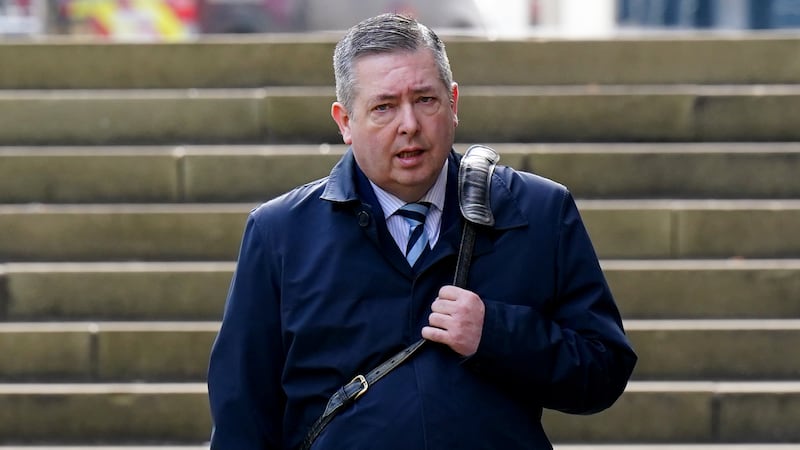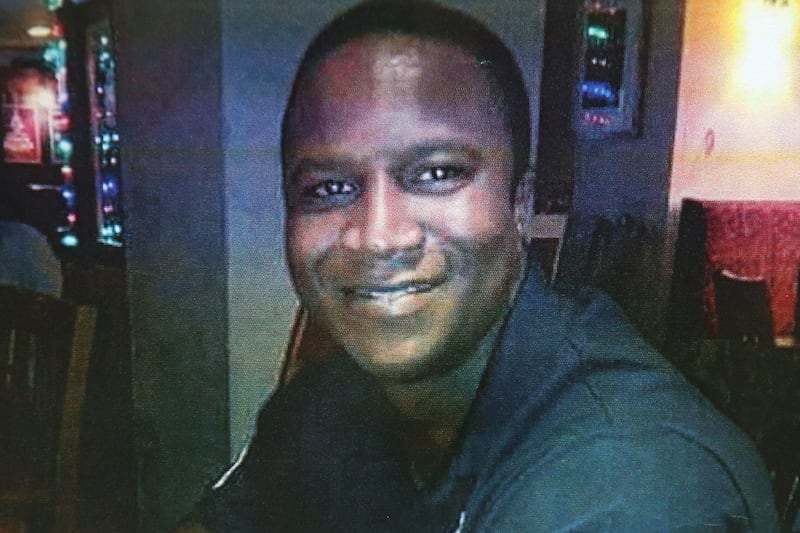The former lord advocate who oversaw the initial probe into the death of Sheku Bayoh has told an inquiry he knew immediately that “issues of racial motivation were going to be front and centre of the investigation”.
Frank Mulholland brought up the loss of public trust caused by the racist murder of Stephen Lawrence and said he had “no regrets” about how he dealt with Mr Bayoh’s family, and would do the same again.
Mr Bayoh, 31, a father-of-two, died after he was restrained on the ground by six police officers in Kirkcaldy, Fife, on May 3 2015 after being arrested when he was high on drugs.
The Sheku Bayoh inquiry is examining the circumstances leading to his death, how police dealt with the aftermath, the investigation into his death, and whether race was a factor.
Mr Mulholland, 65, who was head of Scotland’s prosecution service between 2011 and 2016 and chaired a diversity unit, gave evidence to the inquiry on Thursday.
He said he knew the case would be “high profile” as soon as he heard about it.
He used the comparison of the racist murder of teenager Mr Lawrence in London in 1993.
He also mentioned Lanarkshire murder victim Surjit Singh Chhokar, whose killer was convicted 18 years following his death in 1998 at a retrial after Mr Mulholland reopened the case following the reformation of double jeopardy laws in 2011.
This followed two inquiries which reported in 2001, one of which found evidence of institutional racism in the handling of the case by the police and the Crown Office and Procurator Fiscal Service.
Mr Mulholland said he was “surprised” the Police Investigations and Review Commissioner (Pirc) did not launch “an active investigation” into race over Mr Bayoh’s death.

Mr Mulholland said he had worked on a “broad umbrella of hate crime”, including the Glasgow murder of Mark Scott, and had met the families of Lockerbie victims during his time as lord advocate.
He told the inquiry Mr Bayoh’s relatives are “a nice family” who “didn’t ask to be propelled into this”, and justified a decision to share evidence through solicitor Aamer Anwar, who he said he had worked with closely and trusted.
He said it was his “obligation” to ensure the family had “effective participation” according to the Supreme Court, and it was his job to know about the case.
A letter was written by Mr Mulholland on May 21, 2015 raising concerns with the chief constable of Police Scotland about “anonymous briefings” on the case from the Scottish Police Federation, which he said upset the family “at such a sensitive time and when the facts had yet to be established”.
He said he had felt compelled to publicly issue a statement “calling for restraint and to allow the Crown Office and Pirc to get on with their jobs”, in October 2015.
Giving evidence, Mr Mulholland said: “In my experience meeting the family of Sheku Bayoh, they were a nice family, they weren’t looking for revenge or someone to pay a price.
“What they wanted was answers – what happened, why it happened, whether anyone was responsible, whether anyone could have prevented the death of a partner, son, and it seemed to me that was hugely important.
“We need to be deaf not to know the difficulties the Stephen Lawrence murder caused and the loss of public trust it caused in the legal process, and in Chhokar how it was dealt with, and the… inquiry about the process that the Crown had failed the Chhokar family.
“As lord advocate I was going to do everything that I could under my watch, which is why I liaised and listened to the family of Sheku Bayoh, I don’t regret it, and if it happened tomorrow I would do the same thing.”
Speaking about the time of Mr Bayoh’s death, Mr Mulholland said: “As soon as I heard about it I knew it was going to be high profile, issues of racial motivation were going to be front and centre of the investigation.
“As lord advocate you are leader of the prosecution service, it seemed to me that what I was required to do was to step up to the plate. I needed to know about the case, if additional resources were required it’s my job to get the money for it.”
Senior counsel to the inquiry Angela Grahame said: “From September 2015 there was reference to race in correspondence but prior to that the Pirc investigation had ‘taken cognisance of race’ but not taken active investigation into race.”
Mr Mulholland said: “I find it surprising, the interaction with Pirc is not just letters, it was quite clear in the conversations that race was front, left and centre.
“Race was front, left and centre as far as I was concerned, I dealt with a broad umbrella of hate crime.”
Mr Bayoh’s cause of death was listed as MDMA, Alpha-PVP and restraint, but Mr Mulholland said he would have wanted the pathologist to be spoken to in a bid to examine this further.
He said: “If for example you prosecuted police officers following this and restraint played a minor part, if they were convicted it would affect sentence, I would have thought. It is relevant.”
The family of Mr Bayoh felt they were being “smeared” and feared leaks may have been coming from the Crown Office, the inquiry heard.
But Mr Mulholland said: “Smearing is not my style, in my time at the Crown I know of no-one who would engage in that type of behaviour. They had Aamer Anwar acting for them, they had me, they could speak to me at any time, there was a regular dialogue with the family.”
Ms Grahame said: “Is there anything you think could have been done by the Crown Office to make it clear the Crown Office was not complicit in these matters?”
Mr Mulholland said: “I have great respect for the family and I felt for the position they were in, which had been thrust upon them. It’s a matter of trust. What you’ve got to do is build up trust and how you’re dealing with the investigation.”
He recalled a phone call with his successor James Woolfe KC and said he suggested “good and regular contact” with Mr Bayoh’s family.
He added he was not concerned that an interim report failed to mention race.
Mr Mulholland said: “I knew race was under investigation so I just assumed race would be dealt with in the final report. So no, I wasn’t concerned about that.”
Later, inquiry chairman Lord Bracadale said: “We are very conscious tomorrow is the ninth anniversary, we know and understand that each anniversary is a distressing time for members of the family and friends of Sheku Bayoh. I want to renew the commitment of the inquiry to a thorough examination of the evidence.”
The inquiry, being held in Edinburgh, continues.








